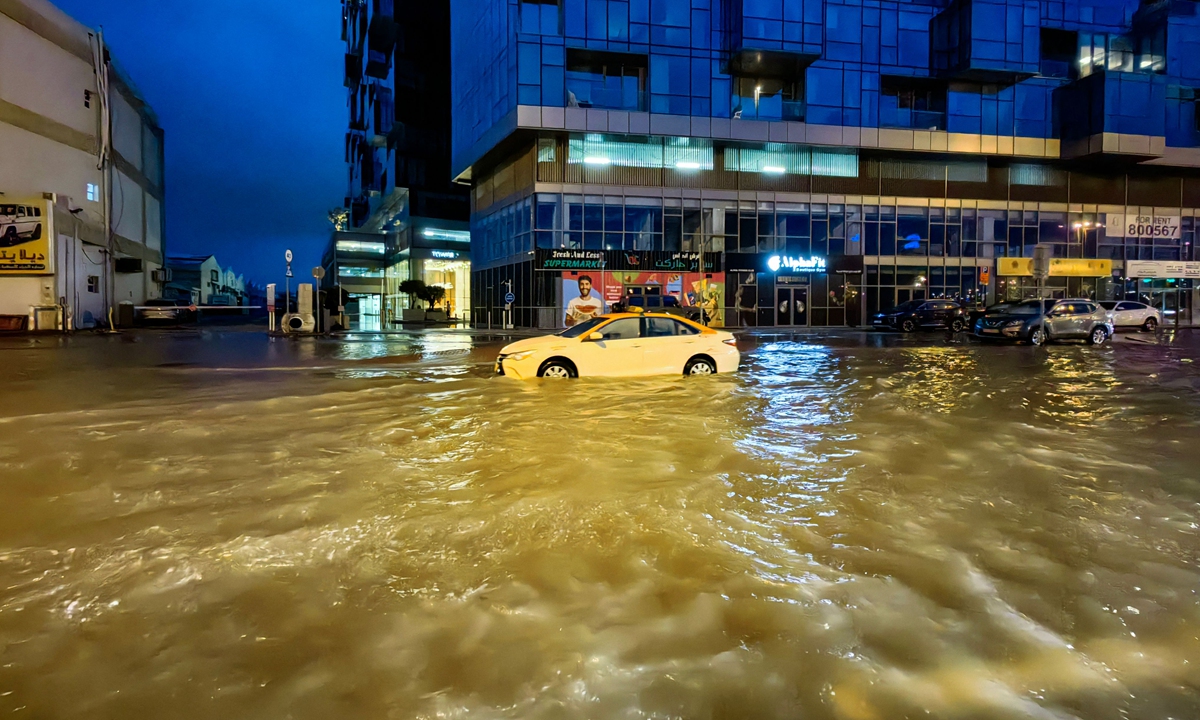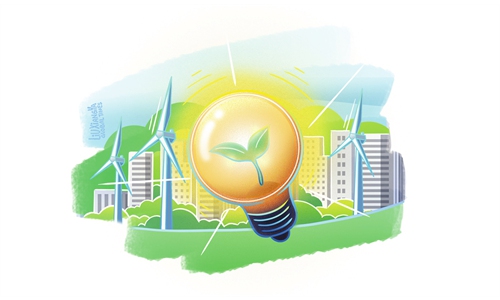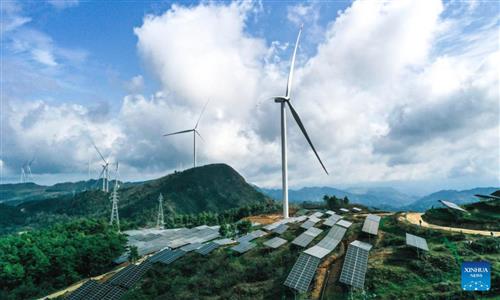'Never thought we can watch a flight take off from the ocean,' rare and record-breaking rainfall in Dubai triggers debate in China on climate change

A taxi drives through a flooded street following heavy rains in Dubai on April 17, 2024. Photo: VCG
"We were desperate," said Chinese passengers who were stranded in Dubai airport for around 40 hours due to a record-breaking storm this week; and Chinese national who lived in the city said the downpour is "more serious to our lives than the Iran-Israel conflict." This rare and record-breaking rainfall in Dubai triggered debate in China on climate change, and how to cope with it.
"Never thought for once that I could be able to see such heavy flood in the desert city of Dubai and watching flights take off from the 'ocean,'" a passenger surnamed Wang told the Global Times on Thursday. Like many Chinese who were stranded in the airport in the past hours, Wang said she was offered with drinks and food. "All the hotels in nearby area were booked and chairs in the airport were occupied, so I had no choice but sat against the wall to rest," Wang said, describing the experience as "glimpsing into the life of a hobo."
Several Chinese passengers reached by the Global Times complained about Emirates Airlines' chaotic management as it kept delaying the flights and canceled some flights after several hours of waiting.
Dubai Airport said on Thursday morning it had resumed receiving inbound flights at Terminal 1, used by foreign carriers, but that flights continue to be delayed and disrupted.
A Chinese national named Joanna Liang, who works in Dubai said that the impact of recent Iran-Israel conflict pales in comparison with the storm's influence on Dubai. "We were hiding in our apartment when the heavy rainfall arrived. The traffic was disrupted," Liang said.
The storm, which hit neighboring Oman on Sunday, pounded the United Arab Emirates (UAE) on Tuesday, flooding roads and causing hours-long gridlock as rainwater inundated homes. One person was reported dead in the UAE while 20 have died in Oman, Reuters reported.
Flooding trapped residents in traffic, offices and homes as the UAE recorded its heaviest rains in the 75 years that records have been kept, authorities said.
The Chinese Consulate General in Dubai had activated emergency response mechanism, it said on Wednesday. As of now, there have been no reports of Chinese citizens being injured or killed. The consulate is currently working on assisting Chinese tourists who have sought help.
The National Center of Meteorology of UAE, a government taskforce responsible for cloud seeding missions in the country, denied reports that it carried out the weather modification technique in the run-up to heavy storms across the country, after discussion of whether cloud seeding was the culprit of the record rainfall gained momentum on internet.
Chinese scientists also believed extreme weather has a bigger role to play in this record rainfall in desert nations.
Global warming increases the water vapor content in the atmosphere, thus the convection of the same strength will result in even stronger heavy rainfalls in a warmer atmosphere, Zhang Wenxia, a research fellow from the Institute of Atmospheric Physics, Chinese Academy of Sciences, told the Global Times.
Global warming may bring extreme weather events to regions where they have not typically occurred in the past, as one of the emerging features of extreme events, said Zhang, given the example of heavy rainfall in the usually dry Middle East.
Pictures and videos of Dubai's downpour also gripped Chinese social media, with discussion focusing on the aggravating global warming, and how cities should cope with extreme weather events. "The city [Dubai]'s drainage system is simply not built for flood like this," Liang added.
In the past three years, Zhang has worked with international scientists to review extreme events every year. In their review of last year's extreme events, they summarized some emerging features of the extreme events, such as the concurrence and sequential occurrence of extremes. "Therefore, the world needs to prepare for emerging features of extreme events," Zhang noted.
Zhang believed that early warnings can play a significant role in helping cities during extreme weather events and reduce damage. She believed this is an area where international collaborations are needed, and it is expected to greatly benefit regions lack of resources. China can play a significant role in this regard.
Early warning system requires a combination of monitoring systems, numerical modeling, physical understanding, as well as a wide range of technologies, and China, a country with abundant experience and willing to help, can contribute substantially to the international collaborations, said Zhang.


